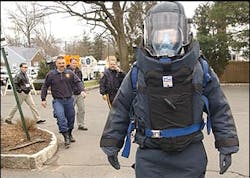N.J. Police, Officials Hold Terror Drill
HILLSIDE, New Jersey (AP) -- The largest anti-terror drill ever undertaken in the United States started Monday morning with police officers investigating a fake car accident on a college campus and health officials on the lookout for a mock biological attack.
Reporters, briefed by officials as though a real attack were happening, were told that a phone tip led officers to a motor vehicle accident where car registrations did not match the vehicles. Meanwhile, doctors were expected to try to connect the incident to a fake patient who had been admitted to a hospital Sunday night with ''flu-like symptoms.''
The $16 million (euro12.42 million), weeklong drill is named ''TOPOFF 3'' for top state and national officials. In addition to the New Jersey attack, it is to include a fake chemical weapons attack in New London, Connecticut, starting Monday afternoon.
All told, more than 10,000 people will participate, including in exercises that will involve officials in Canada and England as well as the United States.
The drills are being monitored by top U.S. Homeland Security officials from a command center in Washington, as well as regional centers in New Jersey and Connecticut.
The exact biological agent to be used in the fake attack was not announced; investigators at Kean University were expected to identify the substances after getting to the scene, just as they would have to do in real life.
Although no real weapons or bio-agents are being used, officials are to respond as if it is the real thing: flooding the area with investigators and first responders in protective suits, sealing off the area, preserving evidence, dispatching fleets of ambulances to hospitals, and dealing with many ''victims'' piling up outside emergency rooms.
More than 8,500 people participated in similar exercises in Seattle and Chicago in 2003 that simulated a dirty bomb explosion and a bioterror attack. The first round, in May 2000, was in Denver and New Hampshire.
''It's a test of how well people are communicating with each other and whether the right people are getting pulled into this exercise,'' Shatzkin said.
On Tuesday and Wednesday, the drill will shift to local hospitals, where hundreds if not thousands of mock ''patients'' will show up in various degrees of medical crisis. Some will be treated in emergency rooms and admitted; others might undergo triage and outdoor decontamination in parking lots, depending on what officials deem appropriate for the situation.
